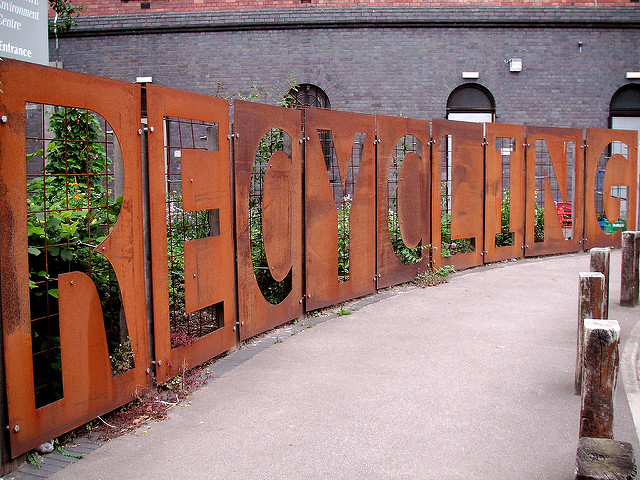I recently returned from a weekend in a large Presbyterian church in Michigan, where I was asked to speak about the faith dimensions of creation care and climate change. In one session, I handed out Bibles and asked members to examine various passages of Scripture for what they say about humans and our role in the world. Even those who weren’t accustomed to interpreting the Bible, once invited to read a passage through the lens of nature, were able to point out themes they had never seen before: the oft-repeated divine promise to “every living creature” in Genesis 9; the celebration of many species in Psalm 104; God’s assertions in Job 38-42 that Job knew little about the other animals in which God delighted.
At one point in the conversation, someone said, “Our church doesn’t even recycle.” I told them how First Presbyterian Church in Jeffersonville got started on its path to becoming Indiana’s first Presbyterian Earth Care Congregation and installing two solar arrays: I had been asked to preach on Earth Day, and everyone was so excited about the sermon that they didn’t talk about it for a whole year. Finally, someone said, “We really ought to recycle these bulletins,” and that was where we started. You start small, with the interest and resources at hand, and you build on that. You include all who are willing, but don’t expect everyone to join in or even to support the program. You just lead, patiently and persistently.
Many resources are available for every interested congregation, from denominational certificate programs to state Interfaith Power & Light chapters, to utility rebates, to scripture and theology itself and group studies that help people make the connections. People get it, but they do need leadership.
Easter falls on April 1 this year. For anyone looking for a post-Easter emphasis, Earth Day falls exactly three weeks later: plenty of time this spring to cultivate renewal in creation care.
Lent 3 (March 4)
- Psalm 19 describes how the mute skies, which moderns consider inanimate, proclaim a living word.
Lent 4 (March 11)
- Numbers 21:4-9 shows a deadly serpent in the wilderness becoming a sign of healing.
- Psalm 107:1-3, 17-22 describes God’s healing of sick people, who were growing “near to the gates of death” (verse 18).
- John 3:14-21 presents Jesus coming so that those who believe “may not perish but may have eternal life” (verse 16).
Lent 5 (March 18)
- Jeremiah 31:31-34, Psalm 51, and Hebrews 5:5-10 all describe deep metanoia as changes in heart through learned obedience.
- John 12:20-33 explains Jesus’ own death, and with it the death of many people and movements: “Unless a grain of wheat falls into the earth and dies, it remains just a single grain; but if it dies, it bears much fruit” (verse 24).
Passion Sunday, March 25
- Isaiah 50:4-9a portrays the prophet describing himself as awakened daily to listen to God.
- Psalm 31: 9-16 describes seeking divine deliverance from scorn and horror, from being forgotten “like one who is dead.”
- Philippians 2:5-11 describes Jesus’ having set the example for Christians by humbling himself, obedient even to the point of death
- Mark 14:1-15:47 tells the story of the woman who, anointing Jesus with pure nard, “anointed my body beforehand for its burial” (verse 8).
Easter Sunday (April 1)
- Acts 10:34-43 recounts Peter’s realizing for the first time that Jesus “is Lord of all” (verse 36).
- Isaiah 25:6-9 envisions a mountaintop where God alleviates hunger, swallows up death, and wipes away sorrow. Within three verses (verses 6-8), the word “all” (kol) is repeated five times: “all peoples (twice),” “all nations,” “all faces,” “all the earth.”
- John 20:1-18 tells of Mary Magdalene’s mistaking the risen Jesus for a gardener — an image with high overtones, given the creation stories’ attention to gardening.
Easter 2 (April 8)
- Acts 4:32-35 describes shared ownership among early followers. As a result, no one goes hungry.
- Psalm 133 exuberantly celebrates the gift of living together, comparing it to anointing with precious, priestly oil, and to the dew of the far-off mountainside of Hermon.
Easter 3 (April 15)
- Acts 3:12-19 depicts Peter — who has just restored the health of a man begging for money — confronting the hypocrisy of those who surround him, whom he says “killed the Author of life,” and calling them to repentance.
Easter 4 (Earth Day, April 22)
- Psalm 23 and John 10:11-18 both draw upon shepherding imagery to describe trust in God’s provision for all needs.
- 1 John 3:16-24 instructs the audience to carry out God’s generosity by providing for the needs of brothers and sisters, loving “not in word or speech, but in truth and action.”
Easter 5 (April 29)
- Psalm 22:25-31 claims that dominion belongs to God, including future generations, the poor, and the entire natural world.
- John 15:1-8 compares Jesus’ disciples to branches of a vine. Abiding in Christ, we bear fruit, and ask for whatever we need.
Patricia Tull’s bimonthly Working Preacher column, “The Great Community,” focuses on ecological themes for preaching.

